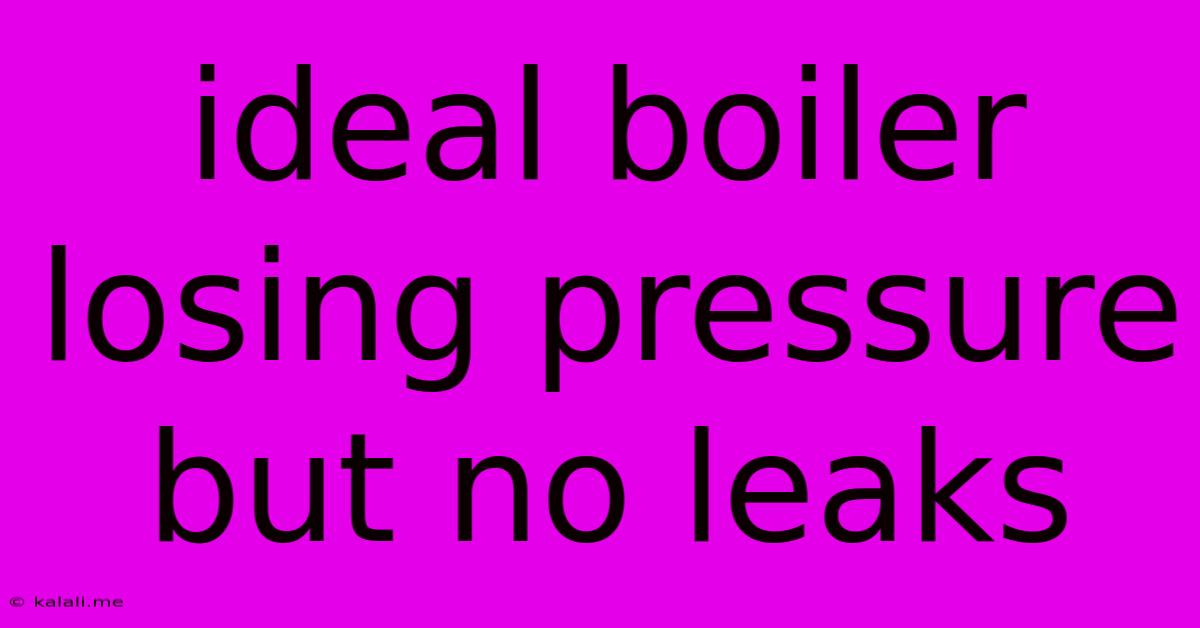Ideal Boiler Losing Pressure But No Leaks
Kalali
May 22, 2025 · 3 min read

Table of Contents
Ideal Boiler Losing Pressure But No Leaks: Troubleshooting Guide
Losing pressure in your Ideal boiler without any visible leaks can be frustrating, but it's a common issue with several potential causes. This guide will walk you through troubleshooting steps to identify and fix the problem, ensuring your heating system remains efficient and safe. Understanding the cause is crucial, as ignoring pressure loss can lead to serious boiler malfunctions.
Understanding Boiler Pressure
Before diving into troubleshooting, it's important to understand that a boiler operates under a specific pressure range. Low pressure means the system isn't functioning optimally, potentially leading to reduced heating efficiency and even system failure. Conversely, excessively high pressure can be dangerous. The ideal pressure for most Ideal boilers is usually between 1.0 and 1.5 bar, although always check your boiler's manual for the precise specifications.
Common Causes of Pressure Loss Without Visible Leaks
Several factors can contribute to pressure loss in an Ideal boiler without any visible leaks. These include:
- Expansion Vessel Issues: The expansion vessel is a crucial component that accommodates water expansion as it heats. A faulty expansion vessel, often indicated by a loss of air pressure within it, will cause water to leak back into the system, leading to pressure loss. This is often the most common cause of pressure drops.
- System Leaks (Hidden): While you might not see obvious leaks, tiny pinhole leaks in radiators, pipes, or the boiler itself can gradually reduce system pressure. These are often difficult to detect visually and may require pressure testing to pinpoint their location.
- Air in the System: Air trapped within the central heating system can cause pressure fluctuations. Air needs to be bled out of radiators and the boiler itself.
- Component Failure: A failing pressure relief valve or other internal boiler components can cause pressure to drop. This usually requires professional assistance.
- Incorrect Pressure Setting: A simple mistake could be that the pressure gauge is faulty or inaccurately reading the pressure. This is usually easily identified with a second gauge.
Troubleshooting Steps
Here's a step-by-step guide to troubleshooting your Ideal boiler's pressure loss:
- Check the Pressure Gauge: Ensure the pressure gauge is accurate and showing the correct reading. Try comparing the reading to a secondary pressure gauge if you have one.
- Inspect Radiators and Pipes: Carefully examine all radiators and visible pipes for any signs of leaks, however small. Look for damp patches, rust, or unusual discoloration.
- Bleed Radiators: Bleeding your radiators removes trapped air, which can influence system pressure. Follow the instructions in your boiler manual for the correct bleeding procedure.
- Check the Expansion Vessel: This often requires professional assistance as it might involve repressurising the expansion vessel, a task best left to a qualified heating engineer.
- Listen for Hissing Sounds: A hissing sound near the boiler or pipes might indicate a small leak, even if you can't visually locate it.
- Pressure Test: If you've eliminated other causes, a pressure test by a qualified heating engineer can pinpoint hidden leaks. This involves isolating sections of the system and monitoring pressure over time.
When to Call a Professional
If you've tried the above steps and still experience pressure loss, it's best to contact a qualified heating engineer. Issues with the expansion vessel, internal boiler components, or hidden leaks often require specialized tools and expertise to diagnose and repair. Attempting to fix these problems yourself could worsen the situation or even cause damage. Remember, safety should always be the priority when dealing with a central heating system.
Regular boiler maintenance is key to preventing such issues. A yearly service will identify potential problems early on and ensure your Ideal boiler operates efficiently and safely for years to come.
Latest Posts
Latest Posts
-
How Do You Save In Bloodborne
May 22, 2025
-
Caught Between A Rock And A Hard Place
May 22, 2025
-
Whats The Difference Between Hens And Chickens
May 22, 2025
-
Remove Dog Urine Smell From Rug
May 22, 2025
-
Wire Speakers To 3 5 Mm Jack
May 22, 2025
Related Post
Thank you for visiting our website which covers about Ideal Boiler Losing Pressure But No Leaks . We hope the information provided has been useful to you. Feel free to contact us if you have any questions or need further assistance. See you next time and don't miss to bookmark.